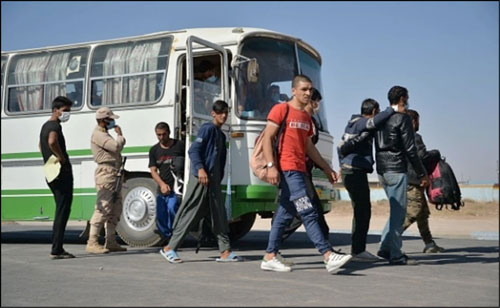Iran is sending tens of thousands of Afghan refugees back over the border, aid agencies and witnesses say, amid allegations of mistreatment by Iranian authorities.
The International Organization for Migration (IOM) found that just over one million Afghans have been sent back this year, including more than 28,000 Afghans in the last week of October, despite the dire conditions awaiting them.
“The majority were deported, returning to Afghanistan often broke and broken, in need of health support, food and rest,” IOM director general Antonio Vitorino said in a statement on Thursday.
Millions of Afghans crossed into their western neighbour seeking to escape violence and a shattered economy after the Taliban takeover of Kabul in mid-August compounded the crisis, disrupting international aid flows just as severe drought left more than half the population facing acute food shortages.
The Norwegian Refugee Council (NRC) estimates as many as 4000-5000 Afghans have been crossing into Iran daily since the Taliban seized power, with hundreds of thousands more expected to arrive in the coming winter.
Last month, the UN declared that Afghanistan was on the brink of one of the world’s worst humanitarian crisis, with more than half of the country facing acute food shortages.
IOM said Iran has returned 1,031,757 Afghans to their home country so far this year. The UN migration agency counted at least 3,200 unaccompanied children among them.
Returning Afghans who spoke to the AFP news agency reported being held in crowded, filthy detention camps where some were beaten before being transported to the border crossing.
“They did not see us as humans,” said 19-year-old Abdul Samad, who was working in construction in Iran before he was deported.
Abdul Samad said he was beaten by Iranian authorities in a migrant detention camp because he had no money to pay for his deportation.
“They tied our hands and blindfolded our eyes with pieces of cloth, and insulted us,” he said.
Buses arrive at Islam Qala, on the Afghan side of the main border crossing with Iran, every afternoon. AFP interviewed some 20 returning Afghans, all of whom had tales of mistreatment.
The UN refugee agency UNHCR has appealed to all nations to stop the forced returns of Afghans given the “highly volatile situation” and has been continuing to “advocate with the government of Iran”.
Iran maintains it welcomes Afghan refugees, provides the necessary assistance, and has sent aid shipments to its neighbour in recent weeks.
Tehran’s ambassador to the United Nations, Majid Takht Ravanchi, was quoted by Iranian media in late October as saying “we are hosting our Afghan brothers almost without receiving any new resources from the international community”.
“In addition to food, shelter, medicine and education, we now provide COVID-19 vaccines to refugees while we are under severe and illegal US sanctions,” he said.
Iran’s Interior Minister Ahmad Vahidi last month called on Afghans not to come to the country because “our capacities are limited”, according to the state-run Tehran Times.
Those who did come to the borders were “treated with kindness and respect”, he added.
Iran shares a 900-kilometre (560-mile) border with Afghanistan and hosts one of the largest refugee populations in the world, made up mostly of Afghans who have arrived over the past 40 years.
According to UNHCR, in 2020 Iran sheltered more than 3.4 million Afghans, including nearly two million undocumented migrants and 800,000 refugees.
Iran and Pakistan together house about 90 percent of the five million Afghans displaced outside their country.
Afghanistan’s neighbours have called on the international community to do more to financially support the region, which has borne the brunt of the refugee flows.— Agencies








